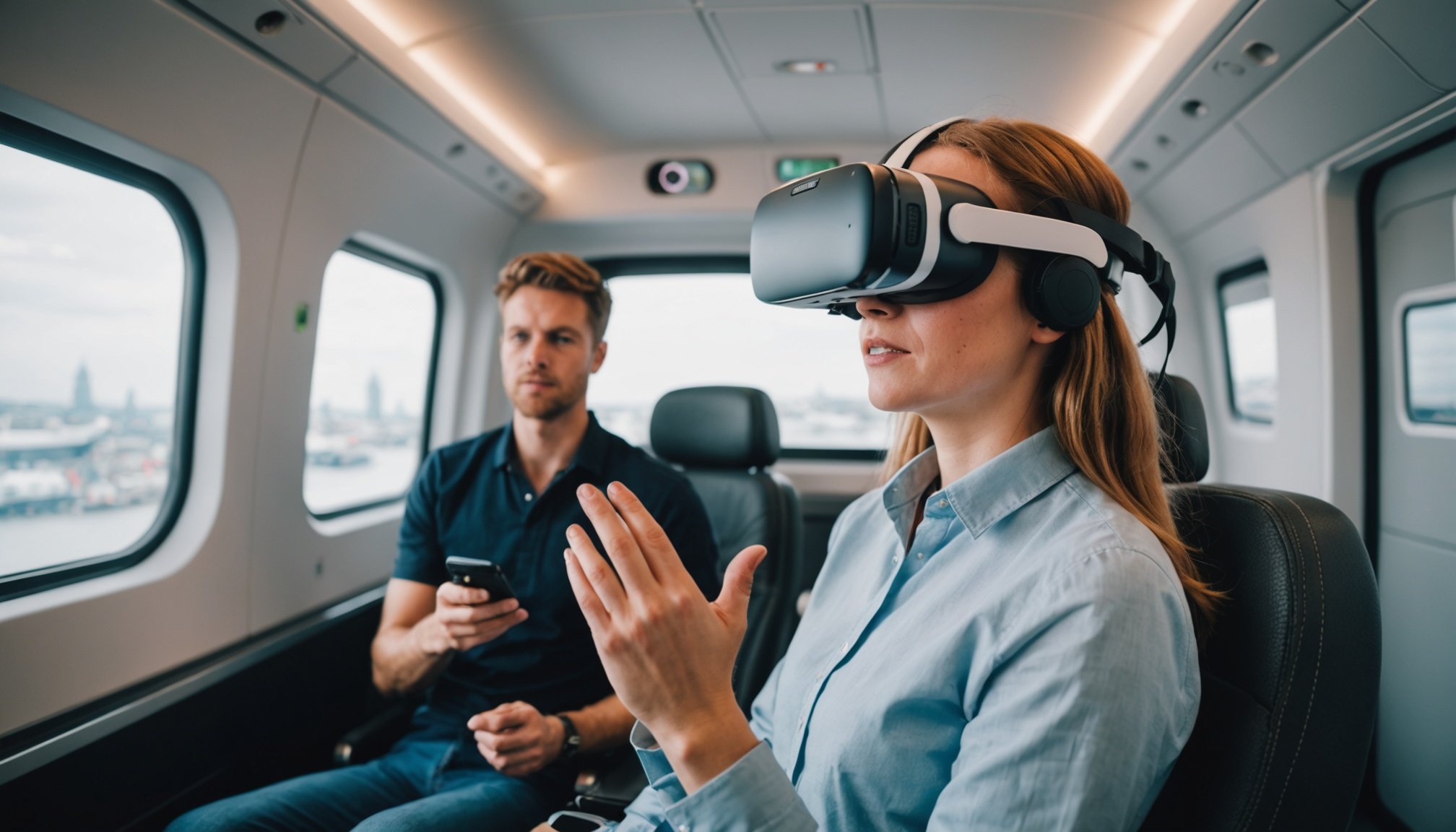Overview of Virtual Reality in Travel
Virtual Reality Travel has revolutionised the travel industry, offering immersive experiences that were once unimaginable. But what exactly is virtual reality? In simple terms, it’s a simulated experience that can be similar to or completely different from the real world. The evolution of VR technology has seen it transform from a niche gadget to a key player in travel technology across the UK.
UK travel agencies are now at the forefront of integrating VR Integration into their offerings. This technology not only enhances the visualization of travel destinations but also engages potential customers more effectively. Current trends indicate a significant uptick in agencies adopting VR tools, with user engagement statistics showing promising results. These tools allow travellers to explore destinations virtually before booking, enhancing the decision-making process.
Also to see : Harnessing AI Power: How UK Tech Startups Predict Market Trends with Precision
Travel agencies are reporting increased customer interaction and satisfaction. As VR continues to evolve, it becomes even more integrated with travel services, providing both consumers and agencies with innovative solutions and experiences. The benefits are clear: VR Travel makes the planning process interactive and engaging, ultimately influencing travel decisions positively.
Benefits of Virtual Reality for Travel Agencies
Virtual Reality (VR) technology offers significant advantages for travel agencies, revolutionizing how they engage with consumers. VR enhances the customer experience by providing immersive previews of destinations. Instead of browsing static images, travellers can now virtually explore sites, making the travel planning process more dynamic and informed.
This might interest you : Unveiling Travel Secrets: How UK Agencies Use Data Analytics to Perfect Vacation Packages
This immersive engagement elevates customer satisfaction. By experiencing destinations in a controlled environment, consumers feel more confident in their decisions, leading to a more satisfying booking experience. VR applications in travel agencies are not only customer-friendly but also financially advantageous. Implementing VR can lead to cost reductions, as agencies may spend less on traditional advertising methods.
Furthermore, VR integration provides a competitive advantage. Agencies that harness this technology can differentiate themselves in a crowded market, attracting a larger clientele interested in tech-savvy solutions. The initial investment in VR may be substantial, yet the long-term benefits from improved consumer engagement and reduced marketing costs present a compelling business case.
In conclusion, adopting VR technology stands as a forward-thinking strategy for modern travel agencies aiming to enhance customer experiences, streamline operations, and maintain a competitive stance in the evolving travel sector.
Case Studies of UK Travel Agencies Utilizing VR
The integration of Virtual Reality (VR) in UK travel agencies marks a significant leap forward in travel technology. Here we take a detailed look at success stories that highlight VR’s transformative impact on the industry.
Agency Profile: VR Travel Agency
One compelling case is VR Travel Agency’s innovative use of VR in their marketing campaigns. They have crafted virtual tours of their most popular destinations that potential customers can explore from the comfort of their homes. This immersive experience significantly boosts user engagement. Customers have responded positively, praising the opportunity to ‘visit’ places before making decisions, which enhances the customer experience.
Agency Profile: Virtual Explorer Tours
Virtual Explorer Tours has implemented VR technology trends to facilitate a unique planning process. Prior to adopting VR, their customer satisfaction was steady, but since the implementation, feedback indicates a marked increase in satisfaction levels. Customers feel more confident in their choices, reflecting VR’s influence on travel innovation.
Agency Profile: Immersive Travel Solutions
Immersive Travel Solutions has taken VR integration a step further. By incorporating VR visuals, they offer potential travellers vivid previews, fostering a deeper connection and understanding of destinations. This strategy has not only improved user engagement statistics but also solidified their competitive advantage in the travel market.
Future Implications of Virtual Reality in Travel
The future of travel is set to be reshaped by rapid advancements in VR technology trends. Industry experts predict transformative changes that will redefine travel experiences. One potential advancement is the combination of AI and VR to create more personalized travel environments, where travellers experience tailored tours based on their preferences.
As VR technology becomes more sophisticated, experts foresee its long-term impact on the travel industry. It is anticipated that travel innovation through VR will enhance not only pre-travel experiences but also in-destination guidance. Imagine using VR goggles to navigate foreign cities or historical sites with real-time translations and information overlays. This innovation could significantly enhance the travel experience by providing interactive, educational content during journeys.
Predictions on how VR will shape future travel agency services are promising. Agencies might offer seamless VR previews not just for destinations, but for alternative experiences like accommodation, local tours, and even restaurant environments. This predictive potential underscores a shift from traditional marketing to immersive engagement, enticing customers with nearly real-life simulations. The challenge will be for agencies to integrate these advancements while maintaining a balance between digital innovation and authentic travel experiences.
Challenges and Limitations of VR in the Travel Sector
The adoption of Virtual Reality (VR) in the travel industry is not without its challenges. Technical and financial barriers can significantly impede small travel agencies from integrating VR into their offerings. The cost of developing high-quality VR content and acquiring requisite technology can be substantial, making it difficult for smaller players to keep pace with industry leaders.
Furthermore, consumer concerns regarding the effectiveness of VR previews must be addressed. While VR provides immersive experiences, there are apprehensions about whether these simulations can truly replicate authentic travel encounters. Some travelers may doubt the accuracy of VR representations, potentially impacting their decision-making.
Integration of VR with traditional travel services is crucial to balance innovation with authenticity. Agencies must ensure that VR experiences do not replace the tangible aspects of travel but rather complement them. This involves creating seamless transitions between virtual tours and physical journeys, enriching the overall customer experience.
Finally, as VR technology continues to evolve, agencies must stay updated with technological advancements and consumer preferences to remain competitive. Addressing these challenges with well-thought-out strategies will be key to leveraging VR’s full potential in the travel market.
Visuals and Examples of Virtual Reality in Action
Visuals play a crucial role in showcasing the immersive potential of virtual reality (VR) in the travel sector. They offer an enticing preview of what’s possible, enhancing user engagement and making experiences more impactful.
Screenshots of VR Previews
Screenshots offer a static yet compelling glimpse into the Virtual Reality experiences available. For instance, a crisp image of a virtual tour allows potential travelers to see the level of detail they can expect. Such visuals can highlight key aspects of a destination, drawing attention to cultural landmarks or picturesque landscapes, which are significant components of the VR travel offer.
Video Clips of VR Travel Experiences
Videos are a step further, providing a dynamic representation of VR. They capture the essence of live experiences, allowing viewers to virtually ‘move’ within a landscape, enhancing their interaction. This moving experience can significantly boost a user’s emotional connection to a destination, making them more likely to engage further and consider an actual visit.
Infographics on Engagement Trends
Infographics present VR’s success through engaging data visualization. They can display statistics on VR integration, illustrating increases in user interaction and satisfaction levels. By using graphics to represent statistical information, agencies can provide a clear view of the effectiveness of travel technology tools.
Expert Opinions on VR in Travel
In exploring the landscape of Virtual Reality Travel, industry insights provide a deeper understanding of its trajectory. Experts within this field anticipate significant strides in travel technology, predicting that VR integration will become essential for immersive travel experiences. The consensus, drawn from interviews and reports, indicates a pivotal shift where realistic simulations could redefine how destinations are marketed.
VR experts, such as those participating in global travel forums, emphasize that the combination of AI and VR might soon allow for unprecedented customization of travel plans. They envision a future where virtual landscapes cater precisely to individual traveller preferences, thus enhancing the customer experience massively.
Moreover, a comparative analysis of industry opinions reveals common acknowledgment regarding the potential for travel innovation. Experts argue that adapting to VR advancements presents both challenges and opportunities. While technical complexities exist, embracing such innovative tools is seen as vital for maintaining competitiveness.
Ultimately, these expert insights shed light on the evolving expectations surrounding VR’s role in travel, underscoring its capacity to revolutionize user interaction and planning processes substantially. Through these perspectives, agencies can glean strategies for future VR implementation.











